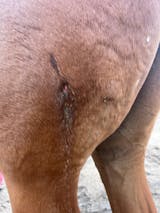Senior Horse Mobility Playbook
Age brings wisdom—and a few creaks. Senior horses thrive when mobility routines are consistent, joints stay supported, and cold weather prep is intentional. Here’s a barn-ready playbook you can use weekly.
The 3 Keys to Senior Mobility
- Consistency: Gentle daily movement beats sporadic hard work.
- Support: Safe liniment and wrap routines ease stiffness without banned substances.
- Adaptation: Adjust routines as temperatures drop and footing changes.
Weekly Routine Example
Mon–Fri
- 10–15 min hand walk + light turnout
- Liniment gel on hocks, stifles, or fetlocks post-work
- Stretch front legs forward gently after rides
Sat–Sun
- Longer turnout or low-impact ride
- Hydro-Lyte in water if workload is higher
- Hoof check & warm mash for extra hydration
When to Escalate
- Heat, swelling, or uneven lameness persists
- Reluctance to walk out or rise
- Weight loss despite normal feed
- Noticeable drop in performance or attitude
These are your signals to loop in a veterinarian and adjust the plan.
Where Draw It Out® Fits
Our Draw It Out® 16oz Gel is safe, FEI/USEF compliant, and built for daily stiffness support. For bigger recovery days, Hydro-Lyte backs hydration and electrolyte balance.
FAQs
How often should senior horses get liniment?
Use daily after light work or as needed for stiffness. Draw It Out® Gel is safe for routine use under wraps or solo.
Is cold weather harder on older joints?
Yes. Cold tightens tissues, making consistent warm-up, hand walking, and post-ride support especially important.
Do senior horses need electrolytes?
If they sweat from work, yes. Hydro-Lyte helps replenish what’s lost—even in cooler temps.
When should I call a vet?
Persistent heat, swelling, or sudden changes in mobility or weight are all clear signals to escalate care.











